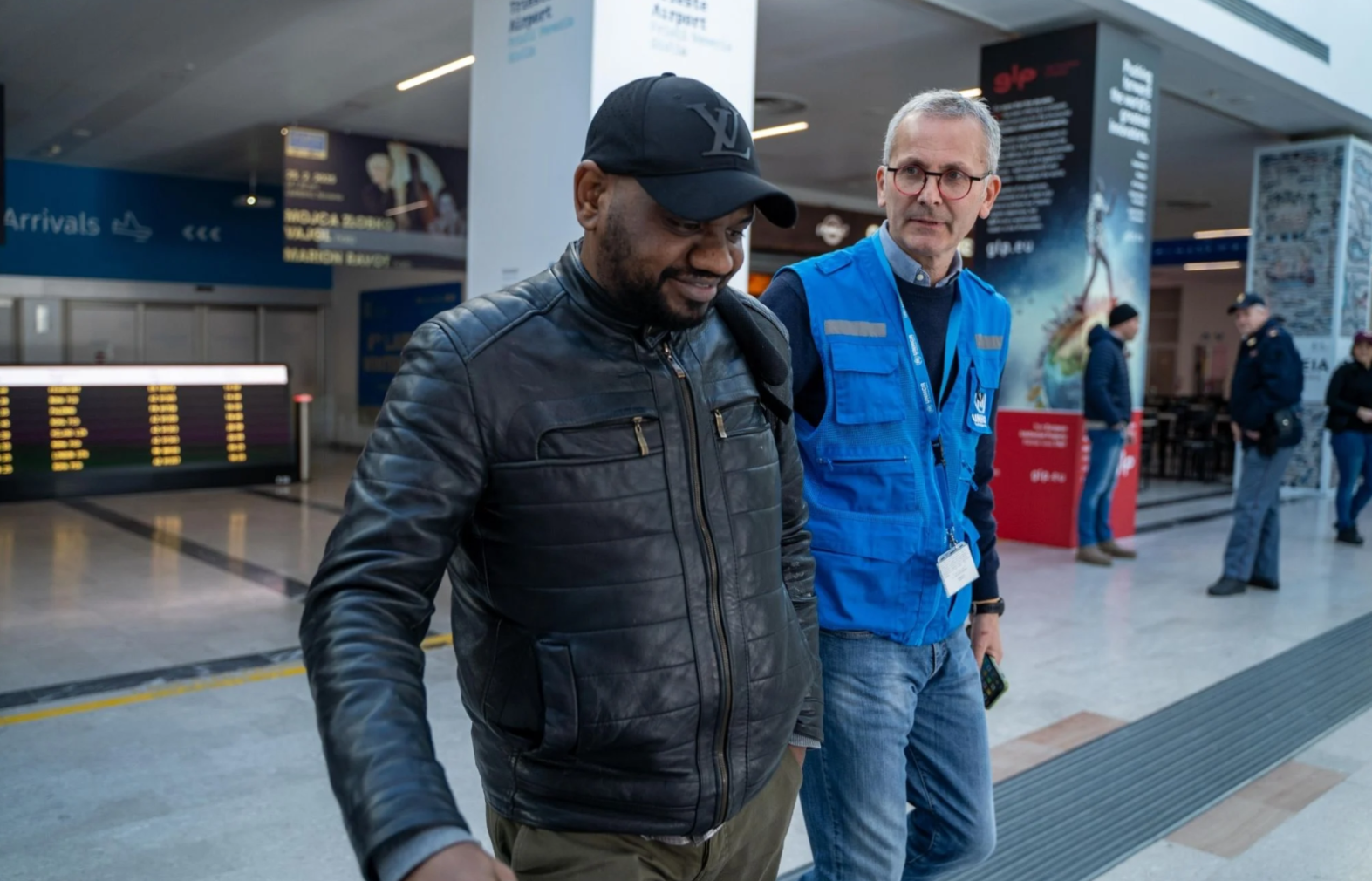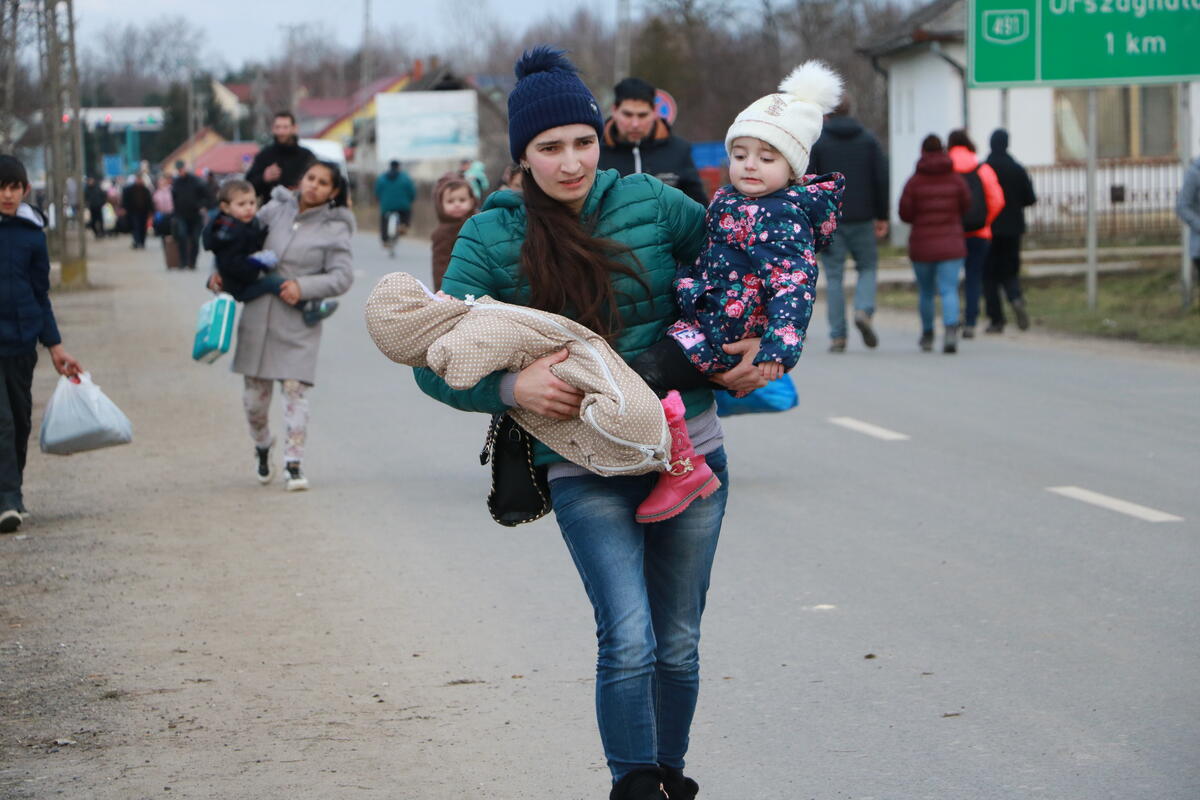Afghan refugee family finds hope in Slovenia after losing everything in Türkiye earthquakes
Afghan refugee family finds hope in Slovenia after losing everything in Türkiye earthquakes

Hasib sits on the living room carpet while his wife Muska pours tea and lays out plates of treats. Around them, their three children play with their toys. They are home, and for this Afghan couple it feels like a miracle. Because for nearly a decade, all they knew was struggle, uncertainty, turmoil and fear.
“If you want a life, you have to survive,” says Hasib matter-of-factly, considering what his family has been through. “Now all we want is stability and education for our children.”
The Joinda family – Haseebullah (full name), 34, Muska, 29, their daughters Maryam, 8, and Esra, 3, and their son Yousuf, 18 months – were resettled from Türkiye, their first country of asylum, to Slovenia in 2024.
They are among a group of 50 Syrian and Afghan refugees who had tried to make new lives in Türkiye only to see everything shattered by the earthquakes in 2023.
A number of countries offer places to especially vulnerable refugees through the resettlement programme of UNHCR, the UN Refugee Agency. Slovenia, with a population of only 2 million, is punching above its weight by taking part in this scheme, available to only 0.4 per cent of refugees worldwide. Beneficiaries are provided with free housing for up to 18 months, language classes and other support to help them get back on their feet.

“Slovenia has the capacity to contribute. If we can, why not?” said Primož Jamšek from the Government Office for the Support and Integration of Migrants. Through its contribution, Slovenia is showing solidarity to other countries hosting refugees, helping to protect vulnerable refugees and giving them durable solutions to their problems, he said.
Romana Zidar, Associate Protection Officer for UNHCR in Slovenia, said the government had taken refugees that are most in need of support. “Resettlement should not be seen as a golden lottery ticket,” she said. “By prioritising the most vulnerable refugees, Slovenia is trying to ensure that the implementation of resettlement commitments benefit those who need it the most.”
Nobody could doubt the Joinda family’s need for a new start in life. They were on the road for so long that all three of their children were born outside Afghanistan.
Hasib and Muska left Kabul back in 2016 because his work as an interpreter made him a target. They applied for visas and flew to Türkiye. Muska was pregnant with Maryam at the time.
Hasib, educated in English and economics, quickly found work sewing curtains. “I was pedalling a sewing machine,” he says. “The wage was 1,200 lira a month but in the first month, I only earned 15 lira. I worked hard and learnt. The next month, I earned 1,200. I live for my family. For me, it would be a matter of shame if I could not provide for them.”
The family moved from place to place in eastern Türkiye. When their visas ran out, they registered as refugees with UNHCR, a step that would prove crucial later on. The Turkish authorities gave them residence papers to live in Adiyaman province.
Hasib got better at sewing and could call himself a tailor. The two other children were born and all three kids grew up speaking Turkish, as well as Farsi like their parents.
“It was 4.17 am,” says Muska. “We were all in bed, asleep. I woke up to feed Yousuf. I felt dizzy. Then the shaking started. The electricity went out.”
The family was on the fifth floor of an apartment block. The tremors of the earthquake became so strong that they fell over as they tried to reach their door. They waited until the worst was over before going down to the main exit, only to find it blocked by concrete. They managed to get out onto the street through a small back door.
All around them, buildings had collapsed. Hasib lost a close friend, who survived for two days under the rubble but died before rescue came.
“It was pouring with rain,” says Hasib, “and the roads were blocked, so aid was slow getting in. We found a school shed to shelter in and lit a fire for warmth. Muska cradled Yousuf to keep him alive.”
After that terrifying experience, which still gives the girls nightmares, the family was again moving around from place to place.
Due to their situation, they were identified as fitting the resettlement criteria and were called by the Turkish asylum authorities to indicate that they were included in the resettlement process through UNHCR, with whom they had registered earlier. Resettlement is a process in which particularly vulnerable refugees, whose situation in the host country becomes unsustainable for reasons beyond their control, are voluntarily transferred to a third country that agrees to accept them as refugees. It is often one of the few mechanisms available that can provide long-term solution for families in very desperate situations.
“’Would you like to go to a third country – Slovenia?’ they asked,” says Hasib. “I’d never heard of it. I asked for some time to think. A friend said, ‘don’t miss this chance, say YES!’ So we said yes.”
After that, the resettlement process took around six months. The Turkish government had referred the Joindas to UNHCR, which interviewed them in Ankara, as did Slovenian officials. The family arrived in Ljubljana in January 2024.
“The whole process was collaborative,” said Ms. Zidar. “Colleagues in Türkiye played their part and from the Slovenian side, the government was immediately on board.”
In the interviews, the Joindas were asked if they could return to Afghanistan. “Our answer was a clear ‘no’ because we have daughters, and we want our girls to be educated.” At 8, Maryam is already showing a talent for maths.
Now in Ljubljana, the children go to school and kindergarten while the parents attend free Slovenian classes every morning.
“Slovene isn’t an easy language for them because they are non-Slavic,” said teacher Natalija Furman-Pogladić. “But they are trying hard. We are halfway through the course. Our topic today is ordering food at the cafeteria.”
Hasib volunteers at the Red Cross and looks forward to increased work opportunities once their language skills improve. In his free time, Hasib enjoys mountain biking and football, Muska goes jogging and Maryam rides her scooter.
But mostly they are just thankful for this opportunity and are hopeful about the future. “This is the last destination for us,” says Hasib. “We feel very comfortable in Slovenia. It’s OK, more than OK. It’s perfect.”










